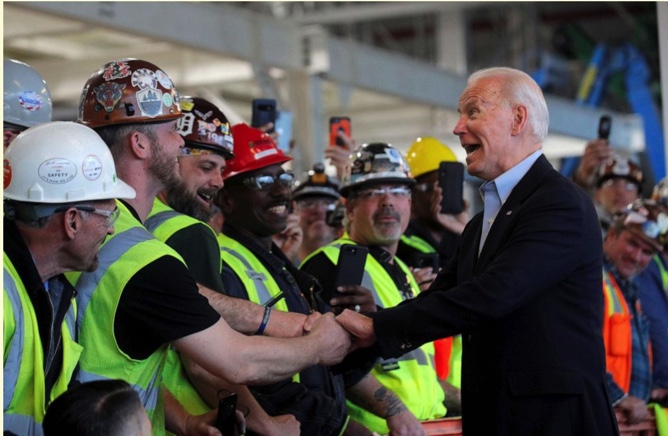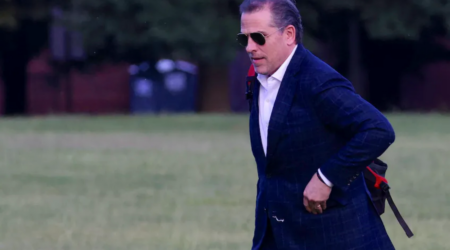By Shivaji Sengupta
Foreign Policy, the very phrase indicates, is about a nation’s relations with foreign countries. Middle class is about people who are neither wealthy nor poor. Then what does “foreign policy for the middle class” mean? Why is it being talked about in relationship to President Biden’s administration?
I first came across the phrase in Joe Biden’s article in “Foreign Affairs.” It is entitled “Why America Must Lead Again: Rescuing Foreign Policy After Trump.” It appeared in the journal after Biden had already declared that he was running For President. The insertion of the former president’s name in the title was meant to squarely set up his candidacy against Donald Trump. The word ” after” lets the incumbent know that Biden means to best the sometime billionaire. I cannot say whether Trump read this article. But you can bet that his advisers did.
Biden has been saying since he started his campaign that it is America’s middle class that has been left out, with the wealthy and the rich benefiting from US policies, economic, domestic or foreign. In the above mentioned article he said that the time has come for the middle class to benefit from not only domestic, but also foreign policy.
Most people, including me, do not think of foreign policy when they think about a nation’s middle class. That belongs to “economic policy,” “home affairs” as they used to say in India or Britain. Here in America too foreign policy for the middle class sounded almost like a contradiction of terms.
It perked up my curiosity.
Joe Biden wants us to realize that “economic security is national security.” American trade policy has to start at home, by strengthening our greatest asset—our middle class—and making sure that everyone can share in the success of the country, “no matter one’s race, gender, zip code, religion, sexual orientation, or disability.” That statement just about sums up what foreign policy for the middle class is about. It is about making policy decisions that directly and indirectly benefits us, the middle class.
How does this differ from Donald Trump’s policy? After all, didn’t Trump also run in 2016 on the promise of bettering the economic conditions of America’s poor and middle class?
Yes, he did. In doing so, Donald Trump set himself up as diametrically opposite of, not only Hillary Clinton, but the whole Republican establishment: of people like Jeb Bush, Marco Rubio, Chris Christie. Indeed, Trump set himself up against the entire Republican institution as we knew it, the party of Mitt Romney and John McCain. The poor and lower middle class immediately
gravitated toward him in the way they still do now. “He is just like us! Speaks just like us!” they say.
It’s true, he does. He speaks just like them mainly for two reasons. He does not appear to have read very much in his life, his vocabulary is severely limited. He does not have to pretend to be like the middle class or the poor. But for his money, Donald Trump is poor.
Interestingly, Joe Biden could have been an almost Trump like character, but for his entry into Washington politics almost fifty years ago. Also, he learned deep lessons from the university of life. He wasn’t poor, but definitely middle class. Biden’s father, unlike Trump’s, didn’t make millions of mostly corrupt dollars. He was a used car salesman, a God-fearing Catholic, steeped in middle class ideals. Trump comes from a wealthy but traumatic family ruled by a despotic, seemingly ruthless father who gave up on his eldest son and drove the younger Donald, whose ruthless streak the father recognized early. The Trumps were not about public good. Riches are what they cared for and they went after money and property for the rest of their lives.” All my life, I worked to make myself rich,” Trump said during a presidential debate. “Now I want to work for America.”
He won the presidency. But he didn’t work for us. Post-presidency, it has become obvious that Donald Trump and his administration did absolutely nothing in terms of setting the United States on a path such that we could lead the world, or have the middle class benefit financially. Those who support him may say Americans were better off financially than they are now. This is true. But the reason for our present difficult economic situation is not Biden, it is a combination of coronavirus and its economic fallout. The enormous monetary that both Trump and Biden engineered, bringing in over $3,000 in each American’s pocket required printing money. Money printed in such large volumes leads to inflation because the more the dollars get printed, the less their value. Coupled with the pandemic resulting in lockdowns which then resulted in factories closing, supply chains dwindling, and people – you and me – having to pay more for almost everything.
Inflation.
The situation Donald Trump left the country in the economic effects – including inflation – are being felt now. He will tell you that the economy was very strong until the pandemic. Yes, but that was at least in part for the economic condition Barack Obama had left the country in. Trump will say the tax break he gave the American people was “the biggest ever in the history of this country.” The Budget Director’s Office, however, during his administration, said that on average the American middle class received about $27 more per pay check. To be sure, those of us who earn middle class wages, twenty-seven dollars are nothing to sneeze at. Every little bit helps! But compare those gains to those who earned over five hundred thousand a year. Their average tax break was over a hundred thousand dollars. So whatever else it was, the Trump tax break was not a rescue of the middle class. For those below poverty levels strewn across the country in several millions, Trump did absolutely nothing.
For Joe Biden to straighten out this mess, to rescue this middle class and the poor stranded by the previous administration, will require enormous investments in our infrastructure—broadband, highways, rail, the energy grid, smart cities—and in education. In the above mentioned article Biden wrote, “We must give every student the skills necessary to obtain a good twenty-first-century job; make sure every single American has access to quality, affordable health care; raise the minimum wage to $15 an hour; and lead the clean economy revolution to create ten million good new jobs—including union jobs—in the United States.” is the connection between foreign policy and domestic economy.
The connection between them is foreign trade. Compared to Trump’s rough-shod unilateral tariffs even on our traditional trade partners like Canada and the countries in the European Union, aggressive trade postures against China which, because of China’s retaliation, Chinese goods sold here began to cost more. Trump’s overly aggressive China policies soon got distracted. It exploded into something that no one was prepared for.
Coronavirus. Caring little for diplomatic niceties, Trump called it “the China Virus” because there is more than credible speculation that Coronavirus originated in Wuhan, China. According to many, particularly Trump’s supporters (that is the minority who accept Trump’s defeat – most do not), Trump would have won but for the pandemic.
We Americans watched askance how Trump’s administration did virtually nothing as millions caught the infection, and hundreds of thousands died. However, he did pump in money into the pharmacies like Pfizer. He ordered them to work as hard as possible to manufacture vaccines that can stem the rot. That is something he did do, and credit should go to him. Several billion dollars were invested, and vaccines were produced by Pfizer, Moderna and Johnson and Johnson in less than a year when normally it takes several years. Unfortunately for Trump, the vaccines appeared after he left the presidency. The Virus has taken over seven hundred and eighteen thousand lives, a hundred thousand more than the 1918 Spanish Flu – and counting. More than half of the dead have come from the poor. Thus Donald Trump’s promise to the poor and the middle class ended not with a bang, but in a whimper. When Joe Biden took over this year he had work to do.
By now, I hope it is becoming clearer what foreign policy for the middle class means. “A foreign policy for the middle class will also work to make sure…when American businesses compete on a fair playing field, they win. We need to be able to build the very best in the United States and sell the very best around the world. That means taking down trade barriers that penalize Americans and resisting a dangerous global slide toward protectionism,” he writes.
As Biden sees it, countries will trade with or without the United States. “The question is,” he writes, “Who writes the rules that govern trade? Who will make sure they protect workers, the environment, transparency, and middle-class wages? The answer is, it is the United States.
That is what a foreign policy for the middle class means.

Shivaji Sengputa is an acadmic and Democratic activist who writes regular opeds for The South Asian Times.










